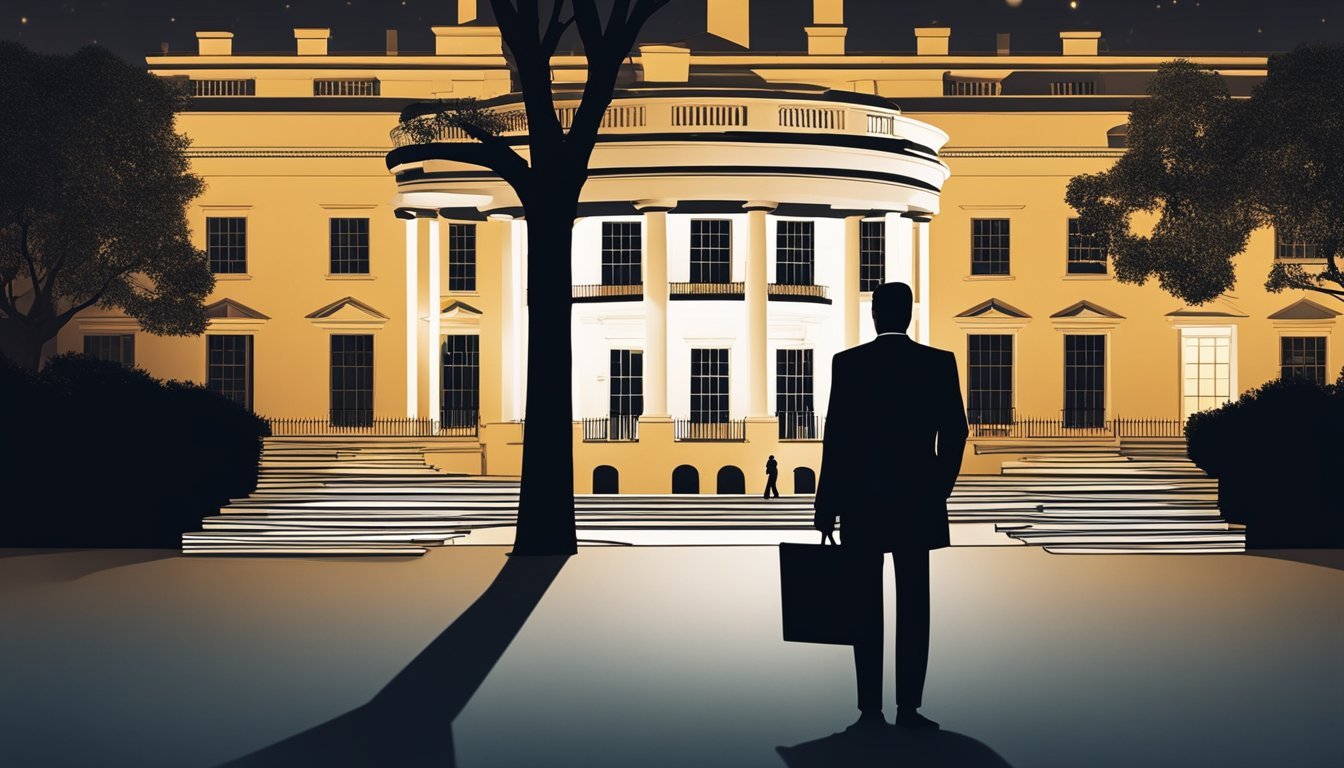8 True Crime Documentaries About Political Scandals in Washington, D.C.
Uncovering Corruption
Washington, D.C., the heart of American politics, has long been the stage for some of the most gripping and notorious political scandals. These scandals are often intricate, weaving tales of power, corruption, and betrayal that captivate audiences worldwide.
True crime documentaries about these events provide a window into the murky underbelly of political operations, offering viewers a detailed examination of the events and personalities involved. From Nixon’s Watergate cover-up to more contemporary controversies, these documentaries unravel complex narratives that have shaped the political landscape.
1) Watergate: The Downfall of a President
The Watergate scandal is a defining moment in American political history. It began with the arrest of five men breaking into Democratic National Committee offices in June 1972.
This seemingly small incident spiraled into a massive political scandal. Investigations revealed extensive political espionage conducted by members of President Richard Nixon's administration.
Nixon's involvement in the cover-up became evident through recorded conversations. The scandal led to Nixon's resignation on August 8, 1974, making him the only U.S. president to resign.
Several documentaries provide detailed accounts of this scandal. "The Final Report: Watergate" (2003) by National Geographic is one such notable film. It offers a detailed exploration of the events and individuals involved.
Another significant documentary is "Watergate" (1994), which delivers an in-depth look at the scandal through comprehensive interviews and archival footage.
A more recent take is "Watergate: High Crimes in the White House" (2018) by CBS News. This documentary revisits the break-in and the subsequent political turmoil, providing fresh insights and perspectives.
For further details, see The Final Report: Watergate (2003) on IMDb, Watergate (1994) on IMDb, and Watergate: High Crimes in the White House (2018) on IMDb.
2) The Clinton Affair: A Look Back
"The Clinton Affair" (2018) delves into one of the most significant political scandals of the 1990s. This documentary series covers the events surrounding the affair between President Bill Clinton and Monica Lewinsky.
Produced by Academy Award-winning producer Alex Gibney and Emmy-winning director Blair Foster, the series combines archival footage with new interviews. It provides an intimate examination of the scandal's impact.
The series features exclusive interviews with key figures, including Monica Lewinsky and investigative journalist Ken Starr. It offers viewers an in-depth understanding of how the scandal unfolded and its lasting influence on American politics.
The documentary aired on the A&E Network and has been acclaimed for its detailed and balanced portrayal. It sheds light on the personal and political fallout from the scandal.
For more information, visit IMDb.
3) The House of Cards: Real-Life Scandals
The political drama "House of Cards" takes inspiration from many real-life scandals, blending fact with fiction.
One notable event linked to the real-life counterpart is the corruption scandal in Turkey. In 2013, Turkish police raided homes of the ruling elite, confiscating millions in cash allegedly used for bribery, highlighting political corruption's deep roots. Read more (2013).
The #MeToo movement brought significant attention to the show with allegations against lead actor Kevin Spacey. Spacey's scandal affected production and cast dynamics, revealing how off-screen misconduct can jeopardize major projects. Read more (2017).
Another parallel is the manipulation and power dynamics depicted in the series. The show's depiction of political scheming mirrors the real thirst for power in D.C., as explored in many political dramas and documentaries. Read more (2013).
4) Abscam: An FBI Sting Operation
The Abscam operation, spanning from 1978 to 1980, was an FBI undercover effort targeting political corruption. Using a fabricated company called "Abdul Enterprises," FBI agents posed as representatives of a fictional Arab sheikh.
The operation led to the conviction of seven members of the U.S. Congress. The footage captured included exchanges of bribes, revealing the extent of corruption within political circles. Some criticized the operation for entrapment, but it nonetheless highlighted serious ethical breaches.
Mel Weinberg, a con man turned FBI informant, played a key role in the operation. His cooperation was pivotal in orchestrating meetings and capturing incriminating evidence.
The term "Abscam" itself combines "Arab" and "scam," reflecting the nature of the sting. The operation remains one of the most significant in the FBI's history regarding political stings.
For more detailed information on the Abscam operation, visit the Abscam Wikipedia page.
5) Iran-Contra: Secrets and Lies
The "Iran-Contra" affair was a significant political scandal in the 1980s. It involved covert dealings and controversies tied to the Reagan Administration. This documentary delves into the clandestine operations where the U.S. secretly sold arms to Iran, then under an arms embargo.
The proceeds from these sales were used to fund Contra rebels in Nicaragua, despite Congressional prohibitions. The revelation of these covert activities led to major investigations, highlighting a web of deceit and political maneuvering.
"Iran-Contra: Secrets and Lies" exposes how senior officials, including those close to President Reagan, engaged in these unauthorized activities. It meticulously examines the complex relationships and the subsequent fallout that reshaped American politics.
Narratives from key figures, archived footage, and expert analysis provide a comprehensive view of the scandal. This documentary covers the initial denials, the eventual admissions, and the legal and political repercussions that followed.
For more detailed information and deeper insights, visit Iran-Contra Affair on Wikipedia.
Released in 2016, this documentary provides a clear and detailed examination of one of America's most infamous political scandals.
6) The Spiro Agnew Scandal
In 1973, Vice President Spiro Agnew resigned amidst charges of bribery, conspiracy, and tax evasion. While serving as the governor of Maryland and continuing into his vice presidency, Agnew was accused of accepting thousands of dollars in bribes in exchange for political favors.
Agnew's resignation marked a significant moment in U.S. political history since he became only the second vice president to resign.
Agnew pleaded no contest to a single felony charge of tax evasion, avoiding jail time in exchange for resigning from office. His scandal came during the Watergate investigation, though he was not directly involved in that separate scandal.
For those interested in true crime documentaries, Rachel Maddow's podcast "Bag Man," released in 2018, covers the details of Spiro Agnew's political downfall comprehensively.
Bag Man on IMDb (2018)
7) The Marion Barry Story
"The Nine Lives of Marion Barry" (2009) presents a detailed look at the life of Marion Barry, the former mayor of Washington, D.C. Known for his charisma and political influence, Barry's career was a mix of significant achievements and personal controversies.
This documentary, directed by Flor and Toby Oppenheimer, explores Barry's rise in politics, his impactful community work, and his eventual fall from grace due to a well-publicized drug scandal.
The film does not shy away from Barry’s infamous 1990 arrest for crack cocaine possession, captured in a dramatic FBI sting. Barry's defiant quote, "Bitch set me up," became a notorious part of his legacy. This pivotal moment is crucial in understanding the oscillation between his political success and personal failures.
Despite serving time in prison, Barry's resilience saw him return to politics, re-elected as a Ward Council Member. His ability to connect with the citizens of Washington, D.C., despite his flaws, remains a central theme of the film.
By showcasing both his victories and his defeats, "The Nine Lives of Marion Barry" provides a balanced portrayal of a complex figure who left an indelible mark on Washington, D.C.'s political landscape.
For more information on the film, visit IMDb.
8) The Keating Five: Banking Scandal
The Keating Five scandal emerged in the late 1980s, intertwining politics and finance in a web of corruption. Five U.S. senators—Alan Cranston, Dennis DeConcini, John Glenn, John McCain, and Donald W. Riegle, Jr.—were accused of improperly intervening on behalf of Charles Keating, chairman of the Lincoln Savings and Loan Association.
This scandal was part of the larger savings and loan crisis of the era, which saw the collapse of over a thousand savings and loan institutions. The senators' involvement raised questions about political influence and corruption, leading to significant criticism and investigations.
John McCain's participation in the scandal, though less severe compared to others, left a mark on his early political career. He frequently addressed it in subsequent years, acknowledging it as a mistake.
The incident stands as a stark reminder of the potential pitfalls when politics and financial interests collide. It prompted calls for reforms in campaign finance and ethics regulations within the Senate.
For more information, visit Keating Five on Wikipedia.
The Historical Context of Political Scandals
Political scandals in Washington, D.C., have deep historical roots and are often precipitated by key events. The political climate and public perception also play significant roles in shaping the outcomes and impacts of these scandals.
Key Events Leading to Scandals
Many pivotal events have instigated political scandals in Washington, D.C. For instance, the Watergate scandal began with the 1972 break-in at the Democratic National Committee offices. This event culminated in President Nixon's resignation in 1974.
Similarly, the Iran-Contra affair, revealed in 1986, involved senior officials secretly facilitating arms sales to Iran, violating U.S. policy and congressional oversight. These initial incidents often uncover deeper issues, leading to broader investigations and significant political fallout.
Political Climate and Public Perception
The political climate often influences how scandals are perceived and managed. During the 1970s, the public's trust in government was already eroding, enabling the Watergate scandal to create a significant impact.
In times of political tension or crisis, such as during the Cold War, the stakes for maintaining a clean public image are higher, making revelations of misconduct particularly damaging. Public perception, fueled by media coverage, frequently determines the intensity of the backlash and the subsequent legal and political consequences.
The Impact of Media Coverage on True Crime Documentaries
The influence of media coverage on true crime documentaries is significant, shaping public perceptions and the documentary industry's approach to storytelling.
Role of Investigative Journalism
Investigative journalism plays a pivotal role in the creation of true crime documentaries. Journalists uncover hidden details, verify facts, and provide a foundational narrative that documentary filmmakers often expand upon. This collaboration ensures that documentaries are grounded in truth and rigorous research.
Making a Murderer is an example where journalists' extensive research influenced the documentary's approach. Investigative journalism also holds power to reignite interest in cold cases, leading to renewed investigations.
Moreover, detailed reports from investigative journalists help maintain accountability. They often expose systemic issues within the criminal justice system, prompting public and legal scrutiny.
Evolving Public Perceptions
Media coverage heavily influences how the public perceives true crime stories. Continuous updates and detailed reporting by media outlets shape viewer opinions before a documentary is even released. This pre-exposure creates a context that impacts audience reception and interpretation of the documentary's content.
For instance, media portrayals of high-profile cases can create lasting impressions about the subjects involved, which filmmakers need to navigate carefully. This dynamic also affects the criminal justice system, as public opinion can pressure legal outcomes and policy changes.
Public sensitivity to victims' stories highlighted in media can lead to ethical considerations in documentary production. Filmmakers must balance creating engaging content with respect for those directly affected by the crimes detailed.
Ethical Considerations in True Crime Documentaries
True crime documentaries often face ethical dilemmas, particularly when balancing accuracy and sensationalism, and respecting the privacy and rights of victims.
Balancing Accuracy and Sensationalism
Documentaries about true crime must present information accurately while maintaining viewer interest.
True crime filmmakers often face the challenge of how much they can dramatize events without distorting facts. They must avoid sensationalism that can lead to misinformation and unwarranted public judgment.
In cases involving political scandals, it's vital to present the complexities without oversimplifying the storyline to keep it engaging.
Accurate timelines, verified sources, and objective narration help maintain credibility. Manipulating content for dramatic effect can undermine the trustworthiness of the documentary, misleading the audience about key events and figures involved.
Respecting Privacy and Victims' Rights
Respecting the privacy of individuals and upholding victims' rights is crucial in producing true crime content.
Filmmakers must obtain consent before featuring victims or their families and be sensitive to their portrayal. This is especially important when dealing with living persons who were affected by the crime.
Ethical producers should avoid exploiting traumatic events and protect vulnerable subjects from further harm. Revealing too much personal information or showing graphic content without proper context can lead to re-traumatization.
Confidentiality agreements and consulting with legal advisors can help navigate these ethical waters, ensuring the documentary does not cause additional distress to those involved. Properly handling these aspects fosters a more respectful and responsible approach to documentary filmmaking.







